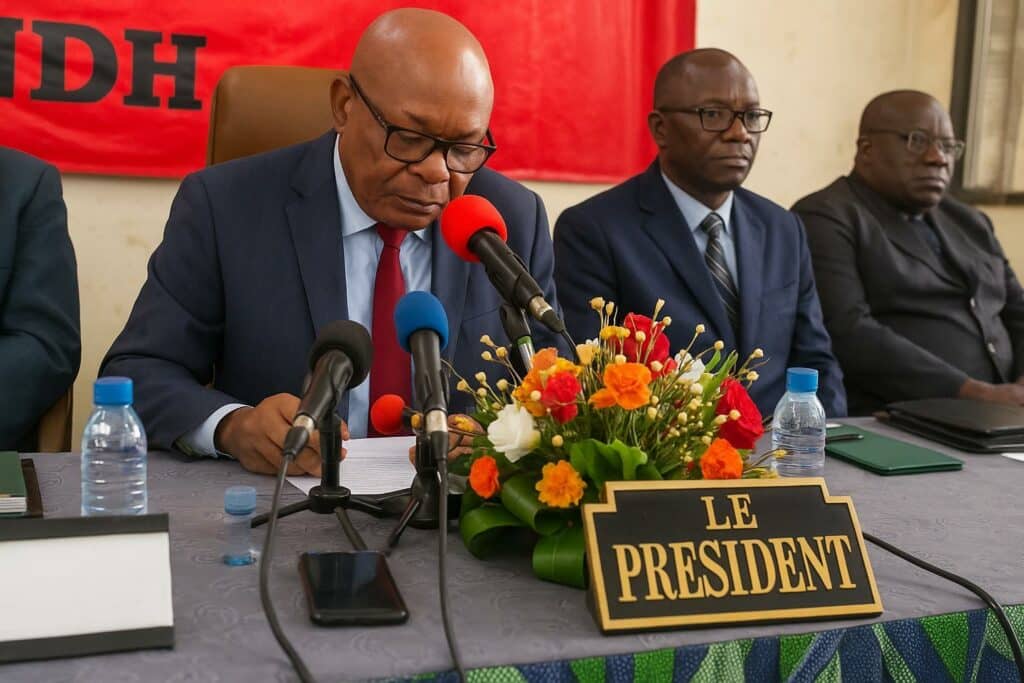Fresh Mandate, Elevated Expectations
In the hushed auditorium of the Commission’s Brazzaville headquarters, newly elected chair Casimir Ndomba opened the inaugural session of the National Human Rights Commission with a pledge to infuse the institution with renewed momentum. The four-day meeting, held from 22 to 25 September 2025, reunited the commissioners appointed last May and signalled the operational start of a mandate that aspires, in Ndomba’s words, to make the Commission “a reference point for dignity in the Republic of the Congo”.
The presence of United Nations Resident Coordinator Abdourahmane Diallo, alongside senior officials and representatives of the diplomatic corps, underscored the international resonance of the gathering. For observers, the new leadership arrives at a moment when citizens are increasingly vocal about accountability and when continental peers are multiplying oversight bodies, raising the bar for national institutions.
Strategic Blueprint Anchored in National Vision
Central to the session was the adoption of a triptych of foundational instruments: the internal regulations, the financial rules and a triennial strategic plan. The latter articulates measurable objectives that echo the Head of State’s commitment to placing human dignity at the heart of justice and social cohesion initiatives.
According to internal sources familiar with the draft, the plan prioritises early-warning mechanisms, more frequent field missions and systematic follow-up on recommendations addressed to ministerial departments. By aligning its objectives with the government’s broader governance agenda, the Commission positions itself as both guardian and partner, a dual role that observers deem essential for constructive oversight.
Synergies with Civil Society and UN Partners
In his address Ndomba stressed that civil-society organisations are often the first to document alleged abuses. The Commission therefore intends to formalise consultation frameworks allowing non-governmental actors to submit alerts and contribute to thematic reports. Such cooperation is conceived not as a delegation of responsibility, but as a dialogue designed to widen the evidence base and refine policy advice.
The pledge resonated with the United Nations delegation. Abdourahmane Diallo reaffirmed the UN’s readiness to provide technical assistance, capacity-building and comparative expertise from other francophone commissions. Analysts note that this triangular dynamic—state institutions, civil society and multilateral partners—reflects best practices recommended by the Paris Principles governing national human-rights bodies.
Operational Reforms for Measurable Impact
Beyond strategic rhetoric, commissioners debated granular reforms intended to strengthen day-to-day performance. Draft resolutions envisage digitalisation of complaints management, a rotation system for investigative field teams and a public calendar of hearings to foster transparency. Emphasis was also placed on gender balance within sub-commissions so that inquiry panels better mirror Congolese society.
Financial oversight, often the Achilles heel of watchdog institutions, received particular attention. The new financial regulations create internal auditing provisions and specify reporting deadlines consistent with the Supreme Audit Institution’s guidelines. These safeguards are designed to secure donor confidence and to ensure that each franc allocated to rights promotion yields demonstrable results.
At a Glance: Key Takeaways
While the session was largely procedural, it delivered symbolic and practical signals. First, the swift approval of core texts suggests a cohesive board determined to avoid institutional latency. Second, the public references to the presidential agenda indicate convergence rather than confrontation between the Commission and the executive branch. Finally, the explicit courting of civil society and UN support hints at a strategic openness that could amplify the institution’s voice in regional fora.
Legal and Economic Focus
From a legal standpoint, the Commission’s expanded investigative mandate could influence the jurisprudence of common-law and civil-law courts operating in mixed jurisdictions across the republic. By issuing amicus-curiae observations, the body may shape interpretations of due-process guarantees and detention standards. Economically, a credible human-rights climate is increasingly considered a risk-mitigation factor by investors assessing markets in Central Africa. Improved rating in governance indicators could therefore translate into favourable borrowing terms for Brazzaville and stimulate foreign direct investment in sectors such as energy and infrastructure.
Several jurists interviewed express optimism that the strengthened Commission will help consolidate an environment where the rule of law and economic ambitions reinforce one another, rather than compete for political attention. Their assessment echoes a regional trend in which governance and growth are treated as complementary pillars of sustainable development.

